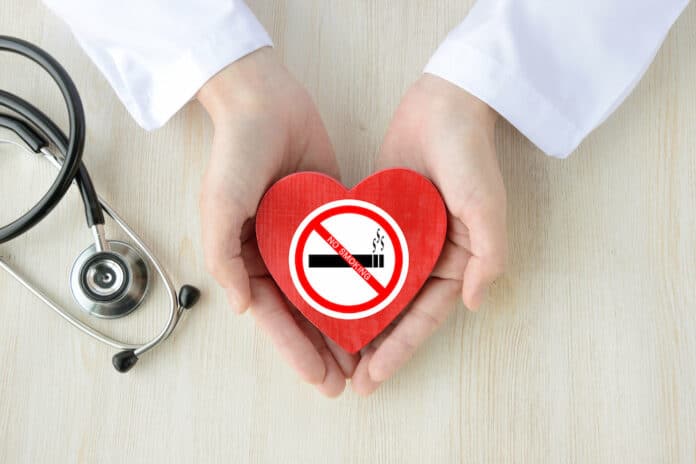
The World Health Organization (WHO) and global partners are asking millions of tobacco users to commit to quit this World No Tobacco Day, 31 May.
According to the WHO, worldwide around 780 million people say they want to quit, but only 30% of them have access to the tools that can help them do so.
In Australia alone, data from the Australian Bureau of Statistics reveals between 2017 and 2018, over 2 million adults were daily smokers; while a further 1.4% of people also reported smoking, they did so on a less than daily basis.
To help Canberrans learn more about quitting, we share this Q&A with Cancer Council ACT Smoking Cessation Coordinator, Lauren Atchan.
What is your role at Cancer Council ACT?

Cancer Council ACT Smoking Cessation Coordinator, Lauren Atchan has experienced her own quitting journey and understands the difficulties smokers face when trying to quit.
As the Smoking Cessation Coordinator, I hold one-on-one brief interventions, present educational seminars and training programs to empower people to quit smoking.
I am implementing a new program into the ACT called ’Tackling Tobacco’. This program has been successfully running in NSW for 10 years and I hope it will have the same effect in the ACT.
I also attend various committee meetings and support my fellow Cancer Council ACT employees, with other cancer support and educational programs.
This year’s theme is ‘Commit to Quit’. What is your personal experience with smoking and commitment to quitting?
I was introduced to cigarettes when I was 15 by my friends whose older siblings smoked.
Even though I did not enjoy it, I continued to smoke. By 16, I regularly smoked cigarettes when I was with my friends. The increasing cost of smoking was the main factor for why I quit.
I decided to stop buying cigarettes and claimed I was a non-smoker, but I continued to smoke as a ‘scab’, including asking strangers for a cigarette. Over time, my ‘scabbing’ habit only occurred when I was out drinking and, eventually, I stopped ‘scabbing’ for good and became an official non-smoker.
What advice would you give to other people who smoke and are trying to quit?
Anyone that has been through addictions will agree that a quit journey never really ends. It has now been 12 years since I stopped smoking and I still must use my willpower to not ask someone for a drag if I am having a catchup with a friend who smokes.
In my case, changing my mindset was the first step. If you are still smoking but know you want to quit, start calling yourself a non-smoker and believe that one day you will be. It may take months or years, and you may have relapses but it’s important to believe a day will come that you and your body will be smoke free.
The second step is to use the support services and products available to you. I wish I had known about people doing my role because I could have used the encouragement from one-on-one support sessions. The drug and alcohol counsellors at Quitline 13 78 48 are also very supportive and you can remain anonymous.
To reduce the urge to smoke, nicotine replacement therapies (NRT) are available from pharmacies, some supermarkets, or your local health services. NRTs provide low levels of nicotine, without the other dangerous chemicals found in cigarettes, and can help stop the withdrawal symptoms having negative impacts on your life.
Quitting is hard. Quitting alone makes the quitting process harder than it needs to be. Make sure you reach out when you need support.
What are some of the added benefits when you quit smoking?
There are several health benefits associated with quitting. The short-term changes will be noticed first – so, hair smells better, teeth and fingers are no longer discoloured, and bad breath is gone. The other health benefits include improvements in heart rate, blood pressure, and shortness of breath, including less mucous build-up, so no more ‘smoker’s cough’.
The long-term health benefits are where quitting smoking is truly significant. A person who has successfully quit smoking has decreased their risk of lung disease, cancer, heart disease and stroke. Long-term smokers also have poor blood circulation; therefore, they have slow wound healing, and they also suffer from vision problems.
Vaping is a hot topic in Canberra at the moment; do you have any thoughts/insights on this?
I think it is important for us to be reminded that vaping products are not TGA [Therapeutic Goods Administration] approved.
Vapes and vaping have not been around long enough for us to know what the long-term effects of first-hand and second-hand vape smoke are on the human body.
We all need to be aware that vapes and vaping are becoming very popular among younger people.
When tobacco first came out, adolescents were targeted, and it has taken generations to reverse the damage. To combat this, the conversation about why life without smoking is more positive than life as a smoker needs to be loud and heard by as many as possible.
If you would like Lauren to help you on your quitting journey, you can reach her on 6257 9999.
For more:








